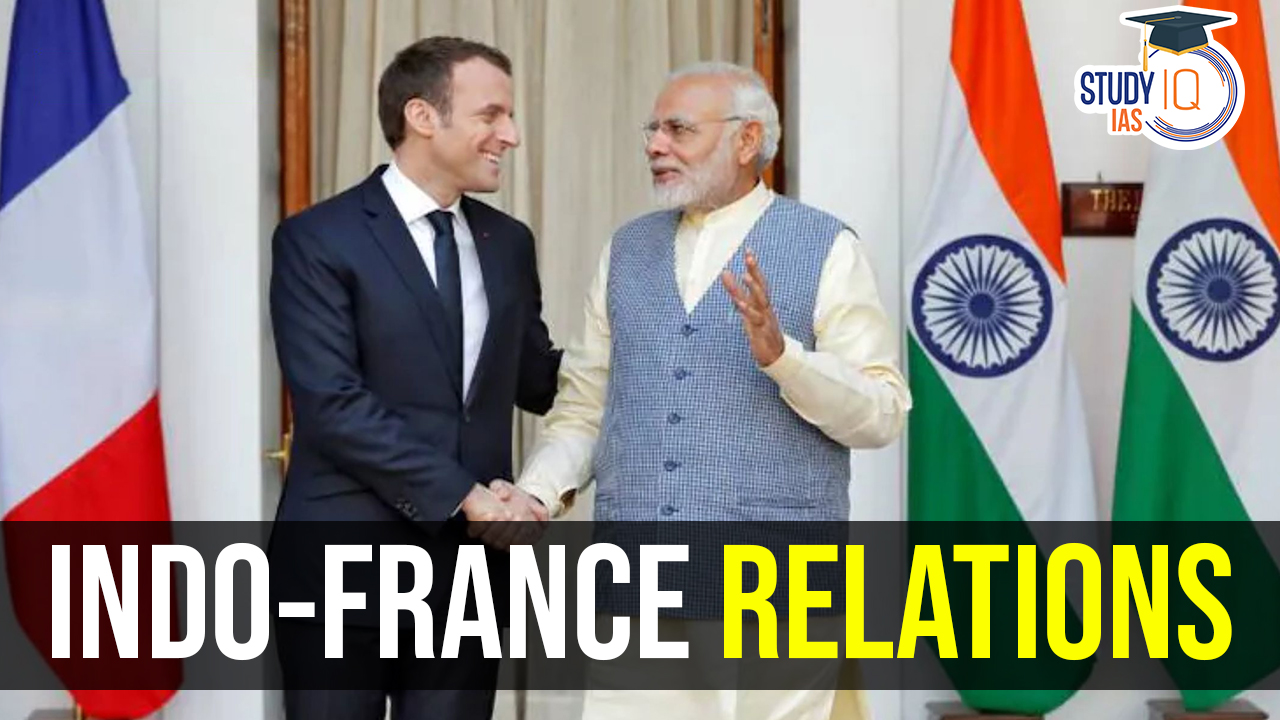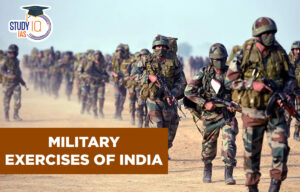Table of Contents
Context: President Emmanuel Macron joined PM Modi at a road show called Shobha Yatra at Jaipur.
About India- France Relations
Areas Of Cooperation
Geo-Political Ties
- UNSC Support: France, a P-5 country, was the first to back India’s bid for United Nations Security Council membership and its reforms.
- Multilateral Regimes: France played a crucial role in India joining the Missile Technology Control Regime, Wassenaar Arrangement, and Australia Group..
Geo-Strategic Cooperation
- Indo-Pacific Engagement: France has extended significant strategic assets in the Indo-Pacific to India, including deploying Indian Air Force planes to Reunion Island.
- Regional Partnerships: France has facilitated India’s involvement in the Indian Ocean Commission and engages in the India-France-Australia Trilateral Dialogue for an open Indo-Pacific.
- Support on Regional Issues: France backs India on Jammu and Kashmir, counters Pakistan-sponsored terrorism, and enhances India’s stance against China.
Defence and Security Collaboration
- Strategic Partnership: In 1998, India and France formed a Strategic Partnership, with defence and security, space collaboration, and civil nuclear cooperation serving as the core pillars of this alliance.
- Key Defence Partner: France has become a primary defence supplier to India, providing critical military equipment like Rafale jets and Scorpene submarines.
- Joint Military Exercises: The two nations regularly conduct Varuna, Garuda, and Shakti exercises across their naval, air force, and army units.
- Maritime Cooperation: Joint patrolling and efforts towards maritime domain awareness in the Indian Ocean region underscore their defence partnership.
Economic Partnership
- Trade Growth: Bilateral trade peaked at USD 13.4 billion in 2022-23, with Indian exports surpassing USD 7 billion.
- Investment: France is a leading foreign investor in India, with investments totaling USD 10.49 billion until December 2022.
- Corporate Presence: Over 1,000 French companies in India contribute significantly to the economy, employing around 300,000 people.
Energy and Climate Initiatives
- Nuclear Energy Support: French backing was pivotal for India’s NSG exemption in 2008, facilitating civil nuclear cooperation.
- NSG Entry Support: France continues to advocate for India’s inclusion in the Nuclear Suppliers Group.
- Solar Alliance Leadership: Both nations were instrumental in founding the International Solar Alliance.
Science and Technology Collaboration
- Space Cooperation: The partnership between France’s CNES and India’s ISRO includes a joint vision for space cooperation established in 2018.
- Launch of 8-10 satellites as part of a “constellation” for maritime surveillance in the Indian Ocean region.
- Joint Missions: Collaborative projects include the TRISHNA Earth Observation Mission, a joint Mars mission, and initiatives to remove space debris.
- Nuclear Project: France and India are co-developing the world’s largest nuclear park in Jaitapur, Maharashtra.
- Advanced Computing: A partnership agreement was established between the Centre for Development of Advanced Computing and Atos, a French IT firm, aimed at fostering collaboration in quantum computing, artificial intelligence, and exascale supercomputing domains.
- Payment System: France is the first European nation to adopt India’s UPI payment system.
Diaspora Connections
- Indian Community in France: Approximately 109,000 Indians, mainly from former French territories in India, reside in France.
- Overseas Territories: Significant Indian-origin populations are present in French territories like Reunion Island, Guadeloupe, Martinique, and Saint Martin.
We’re now on WhatsApp. Click to Join
Significance Of Indo-France Relations
- Indo-Pacific Security: India seeks French assistance to ensure the Indo-Pacific region’s stability and security, countering Chinese influence, exemplified by the India-France Joint Strategic Vision for the Indian Ocean Region in 2018.
- Strategic Independence: The relationship between India and France is marked by strategic autonomy, free from the influence of Anglo-Saxon perspectives in France and anti-Western sentiment in India, as demonstrated by France’s support following India’s 1998 Pokhran Nuclear Tests.
- Access to International Bodies: French backing is key for India’s admission into significant global organisations, including the United Nations Security Council (UNSC) and the Nuclear Suppliers Group (NSG).
- Contributing to Global Stability: The partnership between India and France plays a vital role in counterbalancing Russia’s presence in Europe and China’s in Asia, promoting global stability and balance of power.
- Horizon 2047 Framework: The Horizon 2047 agreement outlines the future direction of India-France cooperation over the next quarter-century, focusing on advanced technological fields like supercomputing, cloud computing, artificial intelligence, and quantum technologies, which are critical for India’s advancement.
Challenges in India-France Relations
- Lack of Free Trade Agreement: The absence of a Free Trade Agreement between India and France has limited the expansion of their economic ties, with bilateral trade falling significantly short of India’s trade volumes with Germany. The stalled India-EU Broad-based Trade and Investment Agreement (BTIA) has also hindered the further development of India-France relations.
- Trade Disparities and Intellectual Property Concerns: Economic relations between India and France are strained by trade imbalances, with France exporting more to India. Additionally, France has expressed concerns over India’s protection of intellectual property rights (IPRs) for French companies operating within India.
- Unrealized Projects: Challenges in India-France relations include the failure to operationalize previously negotiated projects, such as the delayed Jaitapur nuclear project.
- Diverging Geopolitical Stances: France’s direct criticism of Russia’s actions in Ukraine contrasts with India’s more measured stance. Furthermore, France and India hold differing views on China’s Belt and Road Initiative (BRI).
- Shifting Geopolitical Landscape: The dynamics of India-France relations are influenced by evolving geopolitical challenges, including conflicts in the Middle East, Chinese activities in the Indian Ocean, and potential changes in US leadership, such as the possibility of Donald Trump’s return.
Way Forward
- Fast-Tracking the FTA: India should capitalise on its strong ties with France to expedite the conversion of the India-EU Broad-based Trade and Investment Agreement (BTIA) into a tangible agreement.
- Facilitating Mobility and Migration: Both nations should collaborate to enhance the mobility of students, graduates, professionals, and skilled workers, alongside intensifying efforts to tackle irregular migration.
- Boosting Trade and Investments: India and France should aim to augment bilateral trade and investments by establishing joint ventures, broadening trade agreements, and encouraging cross-border investments.
- Resolving Project Delays: The establishment of a joint task force is recommended to accelerate the progress of delayed projects, such as the Jaitapur Nuclear Power Plant.


 Utkal Divas 2025: Odisha Foundation Day ...
Utkal Divas 2025: Odisha Foundation Day ...
 List of Military Exercises of India 2024...
List of Military Exercises of India 2024...
 Africa’s Nuclear Energy Market Status ...
Africa’s Nuclear Energy Market Status ...





















